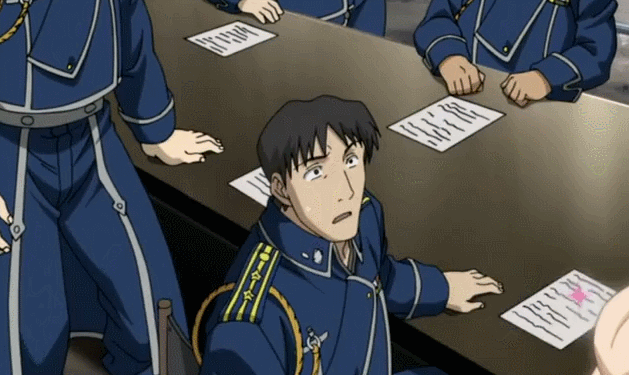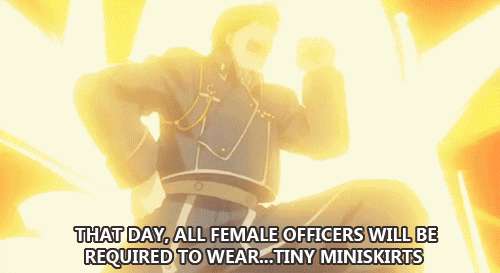In Defense of Fullmetal Alchemist 2003
by Rose Bridges,I've been watching anime since I was in grade school. Like lots of '90s kids, my Saturday mornings were dominated by Sailor Moon, Pokémon and Digimon. Anime was fun, but I never saw it as anything serious—until I hit high school, and my sister introduced me to Fullmetal Alchemist. This was a show that dealt with heavy-hitting topics, from war to racism to what makes us human. On top of that, it also had lovable characters that burrowed into your soul, affecting the viewer emotionally as well as intellectually. It quickly became my favorite anime, and over a decade later, it still is.

So I take it a little hard sometimes when I hear people insist that Fullmetal Alchemist: Brotherhood is the "one to watch," usually because the first anime is too different from the source manga. This is true, but it's not a bad thing. The first anime was designed to be its own story from the beginning, and it holds up well because of that. The two different versions of FMA are great on different merits, and I think even hardcore fans of one can appreciate the other if they keep an open mind.
The 2003 series is due out on bluray pretty soon, so it's high time for a refresher course on just why this show was such an enormous international success and is still absolutely worth your time, even in the shadow of its more popular big brother.
Large Cast of Characters Who Grow Along With You

Fullmetal Alchemist's cast spans many ages, occupations, and lifestyles within its fantasy version of turn-of-the-century Europe. An incredible number of them are complex enough to support their own subplots, often related to but independent of protagonists Ed and Al's quest for the Philosopher's Stone. This makes the show surprisingly rewarding to revisit as you grow up yourself, and your feelings about its characters and their journeys change.
I was a lot like Edward Elric as a teenager, so I resented him at that age for his arrogance and hair-trigger temper. With hindsight and self-awareness, I appreciate him much more. I've also come to love the adult characters more, like Roy Mustang and Izumi Curtis. It's easier to relate to their attempts to atone for their pasts once you've racked up some regrets of your own. This goes for the lighter side of the show, too. Maes Hughes's proud daddy routine is funny on its own, but it becomes especially familiar once you get old enough to have friends who become parents. Mustang should be very thankful that his best buddy never discovered Facebook.
Strong Heartfelt Relationships

Hughes's love for his family forms another part of what makes the show great: its relationships. I'm not just talking about the romantic kind; the series actually has very little in the way of romance. The show explores all the different ways that humans matter to each other, from friends and family bonds, to teacher-pupil connections, or even comrades and commanders in the armed forces. Fullmetal Alchemist is full of families both literal and figurative. Ed and Al make it through their difficult life thanks to the care of many others in the absence of their parents.
Even the villains forge powerful connections with one another, and later with the heroes, that make them question their stances. On the darker side of things, they also take advantage of humans' bonds with others to push them into the desperation needed to try risky alchemy. Still, even if those relationships make us vulnerable, it's clear that they make us better too. All the good characters in the show are able to achieve their goals with the care and even supportive challenging of others. Fullmetal Alchemist resonates with people by exploring the many different ways that people around us create our world.
Complex Good and Complex Evil

Fullmetal Alchemist starts off as a straightforward battle of good-vs-evil, where the Elric brothers' search for the philosopher's stone brings them into contact with a bunch of shady characters, including some undead monsters named after the Seven Deadly Sins. As the show stretches on, these monsters' origin stories are revealed, giving them intriguing arcs that pose important questions about what makes us human. Some of the so-called monsters even switch allegiances and question their own motives multiple times. Even the more obviously evil guys like Shou Tucker, Barry the Chōpper, and the mastermind behind all the curtains, are still given depths rarely afforded to villains in a shonen series. Bad guys are almost never just bad guys in Fullmetal Alchemist.
The heroes are just as complex. They may be on the straight and narrow now, but many have traumatic backstories with repercussions in the future that often tarnish their relationships with other good-hearted characters. This is particularly true of the Amestris military characters, since the military is an institution with darker aims than our heroes initially realize. Ed and Al grow with time, and their beliefs change radically as they get drawn up into that darker world, always meeting new people that re-align their conceptions of good vs. evil.

In the middle of this moral binary, you have people like Scar, an "alchemist killer" who is initially introduced as a villain trying to destroy Ed and Al. When we learn the reasons behind his quest, things get much more complicated. Scar also starts to sympathize with our heroes more over time, but it's never enough to make him completely abandon his aims. Understanding and appreciating his journey forces viewers to ask themselves important questions about racism and the long-term effects of violence. That brings me to my next point...
Political Commentary that Remains Relevant

Stop me if you've heard this one before: an idealistic military officer encounters a completely foreign culture and discovers that they're ruled by a despot. That leader controls the people through religious rule and cult of personality. The outsider is determined to free this country from his rule for his own reasons, regardless of what its people think about his methods. He succeeds—but leaves a vacuum to be quickly filled by equally devious forces. The country plunges further into chaos.
That's one of the most important subplots of Fullmetal Alchemist, set up in the very first episodes and paid off heavily by the show's finale. If it sounds familiar, that's because it's based on real events. The creative staff was inspired by the Iraq War, (which had just begun in 2003), but they also wove in parallels to other historical events, mostly from World War II. This explains all the Nazi references in the Amestris military (and even more blatant ones in the movie), but this isn't just a case of Godwin's Law. The series takes the daring route by making you sympathize with characters like Mustang, Hawkeye, Armstrong, and Hughes—before pulling back the curtain to show you the horrible system they're complicit in. Even good people can be caught up in awful causes they don't fully understand. Fullmetal Alchemist posits that we have a responsibility to others to be aware of our place in the world and not get so caught up in our goals that we neglect the bigger picture.
Fullmetal Alchemist also goes out of its way to explore systemic racism, especially in its characterization of Scar. The question of why disempowered people turn to violence is a powerful one, often rooted in specific times and places, but also universal and timeless.
Sharp and Well-Timed Humor
If you're intimidated by all that serious stuff, don't worry! FMA can also be hilarious! The humor is seamlessly integrated into the show, so even when it interrupts a darker episode, it doesn't feel like tonal whiplash. For example, when Ed lets Colonel Mustang's team in on an important, devastating revelation, one of them falls over in his chair—out of the focus of the camera while everyone else reacts more sternly and the scene continues. This is an example of subtlety that doesn't break the tone of the scene, but when the humor decides to break tone intentionally, it's still totally worth it. See the many times Major Armstrong flexes his muscles.

The show still finds room for purely comedic episodes too. Everyone remembers Ed and Mustang's battle in episode 13, because it was full of jokes that became memes.

Another episode near the end of the show's run focuses almost entirely on the zany misadventures of Mustang's subordinates, including a bad date and a goofy ghost story. In both of these, the series still interjects dramatic moments that are necessary to advance important plot points. They're quick, subtle, and don't ruin the lighter mood. These episodes are also timed well on a macro level, since they come between much more serious, depressing story arcs.
Fullmetal Alchemist is masterful at juggling different tones, inspiring tons of running gags while still maintaining a reputation for depth and gloominess. On that note, it's always careful to shine a light through the darkness...
Hope in the Darkest Times

I adore Michiru Oshima's score for this series. Like FMA itself, it's full of variations in style and mood. For most people, the most memorable piece is "Bratja," a Russian-language tune that quickly become iconic among anime fans for its tear-jerking quality. "Bratja" is a sad song, but I think the reason it's so popular is that it also sounds very hopeful. The song reminds viewers that even though the brothers have a tragic past, they'll always have each other, and they'll keep going no matter what.
That's a perfect summation of the series as a whole: even when times are hard, there's always a ray of hope and a reason to move forward. That's why the show's relationships are so important to its appeal. We make our world better by looking out for each other, and we can get through the darkness by leaning on the people who love us.
That part of the series helped me through some difficult parts of my life, and I know I'm not alone in that feeling. Fullmetal Alchemist can get pretty dark, but there's always a little joke and the promise of hope around the corner. Even when things are at their most difficult, there will always be something—or someone—to live for. As Roy Mustang says near the end of the series:
"Nothing's perfect. The world's not perfect. But it's there for us, trying the best it can. That's what makes it so damn beautiful."

Fullmetal Alchemist is a dense show on paper, packed with complex characters and intricate subplots, but it never feels that way. At its core, the story is basic and universal. It wears its heart on its sleeve, baring its characters and ideas with powerful sincerity. For that reason, it'll always be one of my favorites. It's an unforgettable story, and that's what made it a classic, hopefully for more generations to come.
discuss this in the forum (164 posts) |